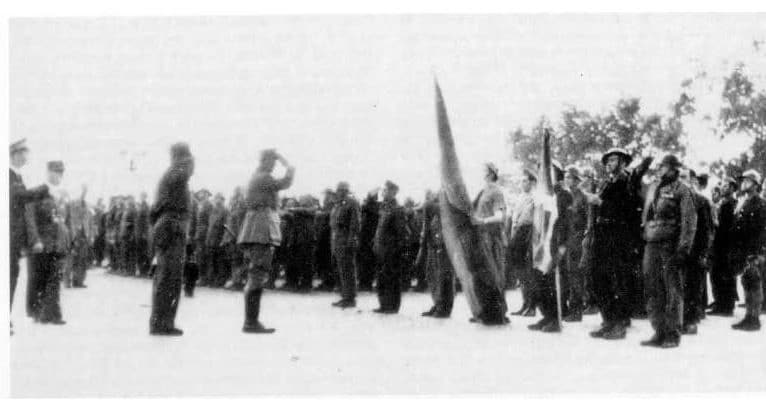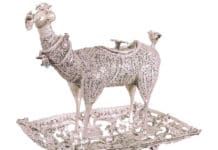This article was translated by John R. Bopp
“Gudaris, we’re far from home, fighting for Euzkadi against fascism. Gora Euzkadi Askatuta”,
Captain Martínez, a socialist, just before the battle
This weekend was the 75th anniversary of the battle at Point de Grave, which took place in the final days of the Second World War, in which the Gernika Batallion, fighting under the Ikurriña, participated.
There are many stories about the efforts of the Basques to fight in their own groups in World War II. It wasn’t easy, but in the last minute, we got it. You can find a very interesting piece by Juan Carlos Jiménez de Aberasturi Corta, “Los vascos en la II Guerra Mundial: De la derrota a la esperanza“ (The Basques in World War II: from Defeat to Hope) on Euskomedia. Here, you will find a description of all the front-line movements of the Basque nationalists and republicans in their anti-fascist struggle. It’s definitely worth reading.
The fight against the totalitarian régime extended into the Pacific theater. We’ve collected some stories about the Basques fighting in that part of the world. We’ve also written about the adventures of author Hemingway and his friends in Cuba. And let’s not forget the work of the Basque mugalaris, saving downed pilots and Jews from the Comet Line.
But getting back on track. This weekend, all the Basques who fought in the struggle against totalitarianism and for a Free France were paid the highest honors, the medal France gives to all foreign military forces who fight for her, 12 “Croix de Guerre”, to remember their heroism. The Ikurriña was also awarded this medal.
As historian Jean-Claude Larrondo explains, the gestures and words of General de Gaulle before the Gernika Batallion opened the door to the hope that Franco would fall alongside Hitler and Mussolini.
On April 22, 1945, General de Gaulle landed at the Grayan aerodrome, accompanied by the commander of the French Forces in the West, General de Larminat; he then proceeded to the command post of Coronel de Milleret and reviewed the troops; he stopped before the Basque flag and saluted it at length; he declared soon after to Kepa Ordoki: “Commander, France shall never forget the efforts and sacrificed made by the Basques for the liberation of our land.” Twelve Crosses of War were awarded to the Basque fighters.


Unfortunately, the story ended very differently, and the promises made by the Allies were forgotten, covered up by realpolitik.
The French daily Sud Ouest has published an article about that historic moment and the events paying homage on this anniversary.
We’ve also linked to the article penned by Iñaki Goiogana in Deia, in his “Stories of the Basques” series, narrating that historic event.
Naiz has also published a video with some statements by the last survivor of this Batallion in which he explains his reasons for fighting
We’d also like to leave you with three videos. The first two are very special moments at the event, the playing of the Basque Anthem and the Eusko Gudariak. The latter was performed by the Lehendakari himself with the txistu and the tamboril.
The third is a video report made by The French for a Free France about that battle; the video itself is from 1945.
Sud Ouest – 18/4/2015 – France
«Partis loin de chez eux pour défendre la démocratie»
Et l’ikurriña fut décoré de la Croix de guerre. Nous sommes le 22 avril 1945. Le général de Gaulle passe en revue les soldats qui se sont distingués, quelques jours plus tôt, dans la libération de la Pointe de Grave, en Gironde. Parmi eux se trouvent les hommes du bataillon Gernika. Une unité uniquement constituée de Basques du sud de la Bidassoa.
(Follow-paywall) (automatic translation of this article below)
——————————
Deia – 11/4/2015 – Euskadi
La revancha del ‘Gernika’
EL próximo martes, día 14, se cumplirán 70 años de la batalla de Medoc, una de las últimas de la II Guerra Mundial, en la que participó el batallón Gernika, una unidad militar formada íntegramente por gudaris vascos. A contadas semanas de la finalización de la contienda mundial, la participación vasca en la liberación de Medoc, la península que se extiende al oeste de la Gironda, entre Burdeos y el Atlántico, puede considerarse como la culminación de la participación vasca en el esfuerzo de la guerra.
(Follow) (Automatic translation)
———————–
Source: Irekia – Eusko Jaurlaritza – Basque Government
Text from the Sud Ouest article
“He has gone far from home to defend democracy”
The battalion of Gernika, which participated in the liberation of the port of Bordeaux, will be honored today in the Gironde.
The Ikurriña was decorated with the “Croix de Guerre”. We are on April 22, 1945. General de Gaulle reviews the soldiers who distinguished themselves a few days before, in the liberation of the Pointe de Grave, Gironde. Among them are the men of the Gernik battalion. A unit that consists only of the Basques south of the Bidasoa.
This heroism has been honored on rare occasions. But today! Seventy years later, a ceremony will take place in the municipality of Vendays-Montalivet, in the Médoc. The President of the Basque Autonomous Community, Iñigo Urkullu, and his counterpart from the Aquitaine region, Alain Rousset, will deposit a wreath of flowers, raise the Basque and French flags and plant a Gernika oak seed near the Côte 40 monument.
200 Basque volunteers
The Basque government in exile until the establishment of Spanish democracy, launched, in 1939, a call to action. “Many served as observers, in espionage networks or mugalaris, to evacuate wounded combatants,” reports Jean-Claude Larronde, author of “El Batallón Gernika” (Ediciones Bidasoa, 1995).
In the fall of 1944, this commitment has reached a new milestone. Commander Kepa Ordoki, a native of Irun, manages to recruit about 200 men. Then he gathered his troops in Sauveterre-de-Béarn. “40% were former GUDARI (soldiers) of the Civil War,” says the historian, “the rest of the young refugees who fled Franco’s Spain.” They learn to handle the front-line fighters on the sides of the Maghreb and Black Africa, integrated into the Carnot Brigade.
The Battle of the Pointe de Grave begins April 14, 1945. If the capital of the Gironde is released in August 1944, a German resistance center clings to the dunes. Nearly 4,000 young Nazis, willing to fight to the death. “Bordeaux combines the joy of being liberated and the fear of being liberated,” says General de Gaulle.
“Frustration”
The fight lasted six days. Supported by allied bombing, the brigade is doubled to the opponent. Five Gudari died during the maneuvers, and thirty-five wounded in the exercise and in the clashes.
On April 20, 1945, the publisher of Jacques Lemoine, founder of the “Sud Ouest” begins with great relief. “Port of Bordeaux is liberated,” he wrote. “France will not forget the efforts and sacrifices made by the Basques for the liberation of our land,” Charles de Gaulle was quoted as saying.
“But after that, there was frustration, said Jean-Claude Larronde, they had fought far from home, to defend democracy, some do not understand that, in exchange, France does not help to overthrow the Franco regime, they experienced this as a betrayal “Later, the Lehendakari Jose Antonio Aguirre, said,” When a neighbor’s house is on fire, not the rescue. ”
Pantxika Delobel
Last Updated on Dec 20, 2020 by About Basque Country





